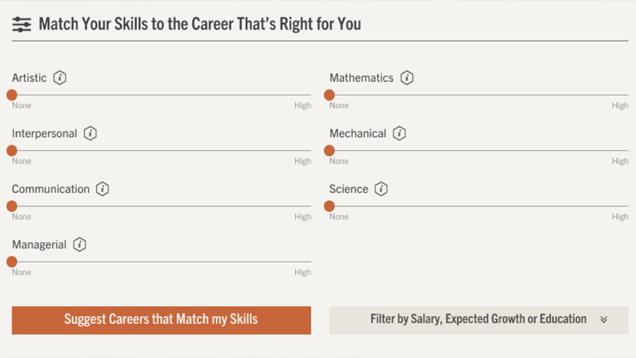Are you getting close to graduation and trying to decide whether to apply to grad school or go out into the "real" world and get some experience under your belt?
One of the hardest—and most exciting—things that you're going to have to do is decide what you're going to do.
With so many career options, and so much uncertainty about the future, there is a lot of pressure to make the "right" career choice. The pressure is made even worse by the fact that, once you've made this decision, it's gonna be incredibly hard to reverse, which is one reason why choosing a career path makes students so anxious.
Sure, there's plenty of good advice on choosing a career path out there, but there's also some pretty awful advice too. So the team here at Brainscape wanted to add our voice and share some of our own strategies and advice on how to choose a career path that will really work for you.
We'll also share the one thing you need to do now to prepare for your career—and succeed in it—whatever it ends up being.
Let's start!
10 Strategies for how to choose a career path
1. See your career as a set of stepping stones, not a linear path

One of the best things you can do right at the outset of this introspection is to understand that most people change their careers many times: about 12 times before you're 40, on average. In other words, there's a lot less pressure to choose a career path and commit to it for life!
This means that you don't need to choose the perfect, forever career for you right now! (Although, if you know what that is, by all means go for it.) Instead, embrace the trial-and-error nature of life and explore career fields that excite you and in which you see a future.
The fact that you can redirect your career path at any point also means that one of the best things you can do is to learn how to learn. The most successful people are those who are adaptable and flexible, quick learners.
Mastering the most effective study habits may be one of the best things you can do for yourself, regardless what career path you take.
2. Think about what excites and energizes you

This one’s a first, obvious step—wouldn't it be great if you could just do what you love?
Sometimes we're lucky enough to make our passion into our career. Some people are fascinated by the natural environment and so they become geologists or earth scientists; others by the law, and so they become lawyers. Others are crazy about metal art and so they become welders!
What do you love to do? Is it cooking or painting or medicine? Find the thing that makes you tick and see if and how it's possible to transform that into a career for yourself.
3. Look to your talents for clues

Okay so you have a good idea of what excites and energizes you. But what if the thing you're good at doesn't really make sense for a career? For example, I love (and am good at) bird-watching. Does that mean I should become a professional bird-watcher? Well, aside from the fact that there isn't really such a thing, even I'd get tired of birdwatching if I had to do it 8 hours a day.
Sometimes it's better to let your passions stay passions.
HOWEVER, while your passions might not immediately translate into awesome career paths, they will point you in the right direction! For starters, they'll tell you what interests you, the environments you like to be in, and the unique skills you have that you could transfer to your professional life.
So, what are you good at? Are you a talented photographer? Are you dexterous with numbers and statistics? Can you write arresting prose? Or are you incredibly handy with a tool set? Use these (passions, interests, and skills) to guide your career direction.
4. Use the G+P+V formula

At the risk of sounding repetitive, we'll drive home one last point: the perfect career for you would most likely fit the G+P+V formula, which stands for Gifts + Passions + Values. You've thought about your passions and your gifts... now think about your values. What's important to you?
Is it helping people? Is it building things? It it creative freedom? Or is it bringing order to choas?
Once you've landed on your core values, think about where they intersect with your passion and gifts. Is there anything that you're passionate about, good at, and care about?
Even if only two of the three things are present, this could point you towards a fulfilling career.
5. Take a career test

Maybe you're still stuck. Sometimes it's super hard to honestly assess what we're good at, what we like, and what matters to us. So, take a test!
You'll find a ton of free and paid career tests on the world wide web: your school and college should have plenty of them too. Just remember that while these tests tend to pigeon-hole people into a set of "categories," their value lies in helping you better understand your strengths, interests, and aptitude, rather than explicitly telling you what you should do with your life.
- This one from Rasmussen College matches your self-reported skills and interests with potential jobs. (They also have a salary and job growth interactive chart.)
- For potential programmers, Switch recommends a coding career based on your preferences.
- About.com’s Job Search site has a collection of other career tests. You can also find a career that fits your motivational focus with this assessment test.
The way to use these tests is as a place for ideas. Obviously, you shouldn't base your whole life on what some algorithm tells you. Still, they can be useful in helping you think about possibilities that you hadn't considered before.
6. Try an internship

If you have some flexibility to take a bit of a lower salary, consider an internship. These are like job trials and can be a great way to test out an industry or type of career. They can even sometimes lead to a full-time job. At the very least, they'll give you the opportunity to build a network of industry professionals, one of which may become your next boss or mentor!
They can also provide you with some really valuable skills. For example, Google internships, while hard to come by, give you a ton of real work. Brainscape interns have also played a huge role in the creation of our product and content.
7. Talk to other people about their careers

Perhaps the best way to figure out how to choose a career path is to ask other people about theirs. People love talking about themselves, and are usually happy to give advice.
You can ask people you know well, like your family, or professional acquaintances in a field you are interested in. You can even reach out to people you don't know through your network, social media sites like LinkedIn, or even directly in a cold email. While it can be intimidating, people are actually usually very receptive to giving informational interviews.
Also, try your local library’s career resource section! The librarian will point you in the right direction.
8. Find a mentor

This is a step up from just asking any old person about how they chose their career path: find a mentor. A mentor allows you to benefit from the learned experience, wisdom, and insights of someone who has walked the path you're walking, taking your career to the next level and keeping you on the right path.
[Here’s how to ask someone to be your mentor.]
If there’s a career you’re interested in, call around to see if anyone in that line of work would let you shadow them for a few days so that you can get a feel of what it’s really like. (Even if that means you have play coffee b*tch for the privilege.) Again, you'll find that companies are, perhaps surprisingly, very open to this.
9. Consider and explore unconventional careers

We all know the popular careers available to us—doctor, lawyer, teacher, computer engineer, police officer, store owner, etc. These are great for lots of people.
But if you feel uninspired by the typical choices, know that there are thousands of unusual jobs you might not have heard about, hidden, perhaps, in the Bureau of Labor Statistics’ Occupational Handbook.
Mashable has a list of six dream jobs that pay well (panda caretaker! Chocolate inspector!), Thought Catalog highlights 10 more (sex toy testers?!), and Chron lists a couple of others (along with related articles like “Unusual careers with animals” and “unusual accounting careers”).
And why not even work with robots? Just be sure to ace your physics tests.
10. Design a career plan

As with most things, setting down some concrete goals and a detailed plan to get from where you are to where you want to be is the best way to progress. Maybe you're currently working as a writer but ultimately want to be the managing editor of a nature magazine. How do you make the transition?
You plan it.
Or, maybe you are currently an editor for your school newspaper, and you want to one day open a restaurant. Map out where you want to go, with concrete milestones, as if it were a four-phase project.
It doesn't matter that you might change your mind or that, very likely, your detailed plan won't, uh, go according to plan. It probably won't. But plan it anyways. It will lay down that clear path for you to follow, which'll allow you to build momentum, preventing you from getting stuck.
Remember, you can always revise your plan later.
[For other great hacks to get you off your arse, check out our comprehensive list of ways to stay motivated when you want to procrastinate.]
What's the best way to choose a career path?

Start with learning.
Your plans won't be set in stone, and that's okay. Your career is a marathon, not a sprint and it can turn out to be a very winding road indeed. That's just life, my friend. But don't let your indecision keep you from starting.
How can you prepare for a career when you don't know what it will be? Get good at learning. Develop good study habits. Learn how to take good notes. Find a learning style that works for you. Get good at motivating yourself to study. And then get the good grades that'll alllw you freedom of choice.
If you are a good learner and you do well in school and college, whatever the area, you'll have what you need to rise to the challenge of any (or all) of the careers you choose.
